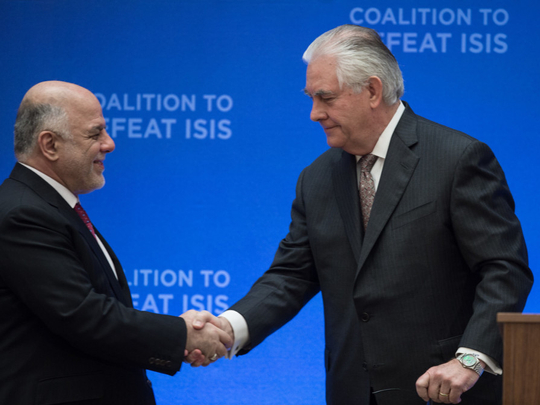
Washington: Senior diplomats from the 68-strong US-led coalition against the Daesh group vowed to seek a quick and lasting victory against the terrorists on Wednesday at a major meeting.
US Secretary of State Rex Tillerson welcomed his counterparts from the mainly Western and Arab alliance to Washington with a vow to hunt down Daesh leader Abu Bakr Al Baghdadi.
Envoys were keen to hear details of US President Donald Trump’s promised tough new strategy to build on coalition battlefield successes — despite concerns about civilian deaths.
Even as the ministers gathered at the State Department, news was breaking of the latest coalition air strike to have reportedly killed dozens of civilians in northern Syria.
Few details of Trump’s plan have yet emerged, but he is said to have given US commanders more leeway to conduct risky strikes on their own authority, and civilian casualties are increasing.
The coalition remains determined, however, to close down the Daesh’s remaining strongholds in western districts of the Iraqi city of Mosul and in the Syrian city of Raqqa.
And as US-led special forces and planes, along with Iraqi forces and local Syria militia groups close in on these prizes, talk is of tracking down the Daesh’s mysterious so-called “caliph”.
“Nearly all of Abu Bakr Al Baghdadi’s deputies are now dead, including the mastermind behind the attacks in Brussels, Paris and elsewhere,” Tillerson told delegates.
“It is only a matter of time before [Al] Baghdadi himself meets this same fate,” he vowed.
‘Global force of evil’
Earlier this month, a US defence official told reporters that Al Baghdadi had fled Mosul and been cut off from day-to-day command of his fighters.
US forces are keen that he not repeat the exploit of the late Al Qaida leader Osama Bin Laden and hide out for years even after his group’s last known strongholds have fallen.
But wherever Al Baghdadi is, the coalition members plan to finish the liberation of Mosul and to press on with efforts to isolate Raqqa and support its recapture by local Arab and Kurd fighters.
“The great commonality among we who have gathered today is a commitment to bringing down a global force of evil and I emphasise the word commitment,” Tillerson said.
“The success of our mission depends on a continued devotion to our stated objective of defeating this terrorist organisation.”
Trump has ordered his generals to craft an accelerated strategy to “eradicate” the group, and the allies hope to learn more during the closed-door discussions and follow up talks.
The meeting at the State Department also allows Trump’s discreet secretary of state to emerge from the shadows and stamp his authority on the diplomatic side of the joint effort.
But Trump’s plan to slash 28 per cent from the State Department’s budget for diplomacy and foreign aid has raised eyebrows, suggesting fewer resources for post-conflict stabilisation.
European diplomats said they expect Washington to reaffirm its commitment to a longer-term plan to secure the region after a battlefield victory.
‘Killing Daesh’
Iraq’s Prime Minister Haider Al Abadi was in Washington for the talks and said victory against Daesh was within sight if allies stick together.
“We are proving that Daesh can be killed, can be eliminated,” Al Abadi said before the meeting. “We shouldn’t lose focus, we shouldn’t give Daesh a second chance.”
Shortly after taking office in late January, Trump gave the Pentagon 30 days to review progress in the anti-Daesh fight and develop a comprehensive plan to “totally obliterate” the group.
So far he has largely stuck with the previous strategy of using US-led forces for surveillance and strikes on terrorist targets, while training and equipping local ground combat forces.
But Trump has made some tweaks, including granting commanders broader authority to make battlefield decisions.
Military officers had complained of micromanagement under former president Barack Obama, but critics worry the military may now risk actions with a greater likelihood of civilian deaths.
Heavy casualties
On October 17 last year, coalition-backed Iraqi troops launched an offensive to retake Mosul from the Daesh group.
By February 19, they had cleared the east bank of the Tigris and had begun to push into terrorist strongholds on the west bank. They have suffered heavy casualties but continue to progress.
Meanwhile, Raqqa is increasingly isolated, but planning for its recapture has been complicated by the diplomatic and political situation in Syria.
The Pentagon is backing an alliance of local Kurdish and Arab militias to take the city, but Turkey has its own rebel force in the region and Russia is backing Bashar Al Assad’s regime.
The United States does not want to commit too many of its own troops to the fight — despite plans to more than double its own 850-strong contingent in the country and add artillery units.












